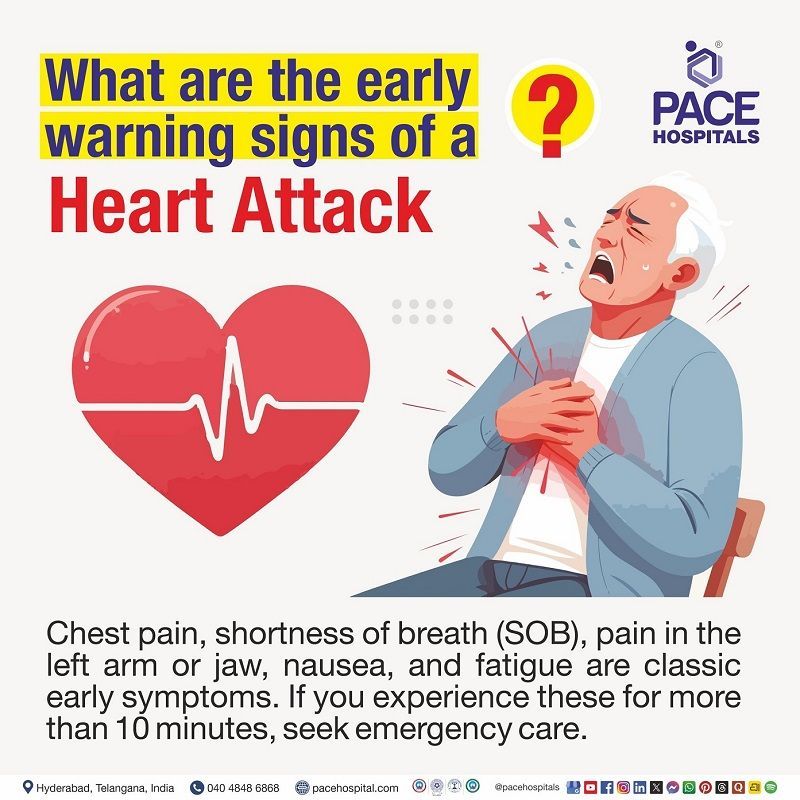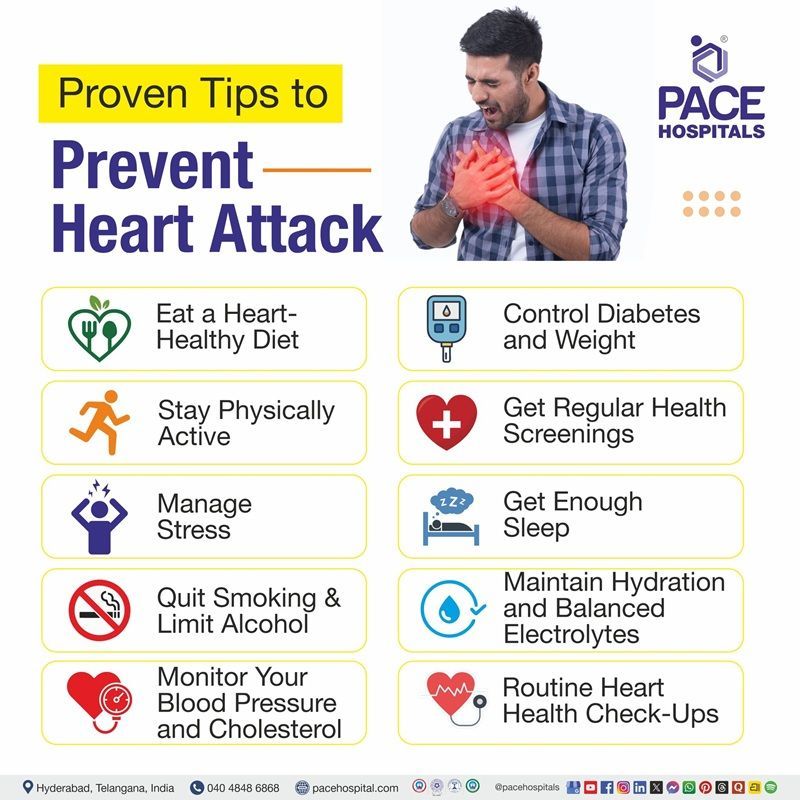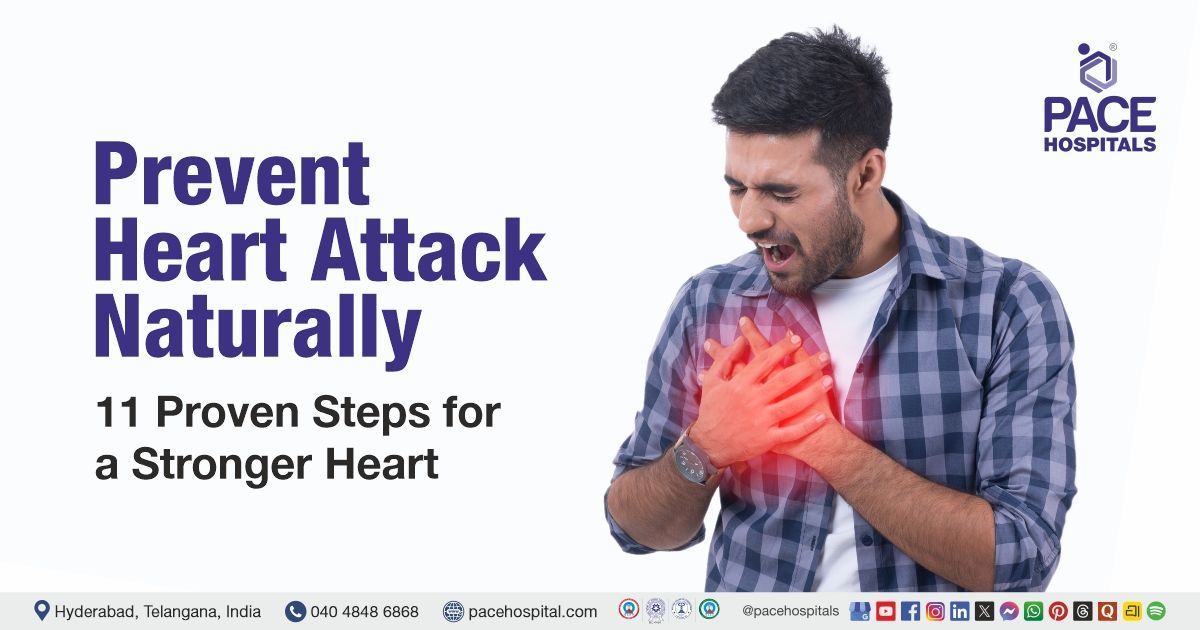How to Prevent Heart Attack: 5 Warning Signs & 11 Proven Tips
PACE Hospitals
Written by: Editorial Team
Medically reviewed by: Dr. Seshi Vardhan Janjirala - Interventional Cardiologist & Endovascular Specialist
Preventing a heart attack begins with understanding your risk factors and taking early, consistent action. This guide explains how simple lifestyle habits such as a healthy diet, regular exercise, stress management, and quitting smoking can significantly protect your heart. It also covers essential diagnostic tests, early warning signs, and when to consult a cardiologist, helping you reduce your risk of a heart attack and maintain long-term cardiovascular health.
Introduction
Heart attacks are one of the leading causes of death globally, yet most are preventable. The good news is that through awareness, timely screening, and healthy habits, you can significantly reduce your risk. Whether you’re in your 30s or 60s, it’s never too early or too late to start caring for your heart.
Understanding a Heart Attack
A heart attack, also termed as myocardial infarction, occurs when blood flow to the heart muscle is blocked due to a buildup of fat, cholesterol, or other substances — known as plaque — in the coronary arteries. The affected portion of the heart muscle is deprived of oxygen and can become damaged or die.
Common causes of heart attacks include:
- Coronary artery disease (CAD)
- Hypertension (High blood pressure)
- High cholesterol
- Diabetes mellitus
- Obesity
- Alcohol consumption
- Smoking
- Sedentary lifestyle
- Stress

Early Warning Signs of a Heart Attack
Identifying the heart attack symptoms early can be lifesaving. The symptoms may appear all at once or develop gradually over time:
- Chest pain or tightness (pressure in the middle of the chest)
- Shortness of breath (SOB)
- Pain radiating to the jaw, arm, or back
- Sweating, nausea, or lightheadedness
- Extreme fatigue or anxiety
Tip: Women and older adults may have subtler symptoms such as fatigue, indigestion, or mild chest discomfort. Never ignore persistent discomfort or breathlessness — seek medical care immediately with cardiologist.

1. Know Your Risk Factors
| Risk Factor | What It Means | Why It Increases Heart-Attack Risk |
|---|---|---|
| High Blood Pressure | BP >140/90 mmHg | Damages arteries and forces heart to work harder |
| High Cholesterol | High LDL, low HDL | Causes plaque buildup and narrows arteries |
| Diabetes | High blood sugar | Damages blood vessels and accelerates plaque formation |
| Smoking | Active or passive | Hardens arteries and reduces oxygen supply |
| Obesity | Excess body fat | Raises BP, cholesterol, and diabetes risk |
| Family History | Parents/siblings with heart disease | Indicates genetic predisposition |
2. Eat a Heart-Healthy Diet
Food choices play an important role in heart health. Follow a Mediterranean-style diet high in:
- Fruits and vegetables
- Whole grains (like brown rice, oats)
- Lean proteins (fish, chicken, legumes)
- Nuts, seeds, and olive oil
Avoid:
- Fried and processed foods
- Red meats and sugary drinks
- Trans fats, high-sodium snacks, and bakery items
Pro Tip:
Consume foods rich in antioxidants, such as berries, pomegranates, and leafy greens, to improve blood vessel function and reduce inflammation.
3. Stay Physically Active
Aim for at least:
- 150 minutes of moderate aerobic activity per week (e.g., brisk walking, cycling, swimming)
- Strength training twice a week
Exercise strengthens your heart muscles, lowers cholesterol and blood pressure, and helps maintain a healthy weight. Even small changes — taking the stairs instead of the elevator or walking after meals — make a difference.
4. Manage Stress
Long-term stress increases blood pressure and triggers the release of harmful hormones, like cortisol, which can strain the heart.
Try:
- Deep breathing or yoga
- Mindfulness or meditation
- Listening to music
- Spending some quality time in nature
- Engaging in hobbies
PACE Hospitals recommends integrating stress management into daily routines for overall well-being.
5. Quit Smoking and Limit Alcohol
Alcohol raises blood pressure and also triglyceride levels, while smoking damages arteries and lowers blood oxygen levels. Within months, your risk of having a heart attack is greatly reduced if you stop smoking and drink in moderation or not at all.
6. Monitor Your Blood Pressure and Cholesterol
High blood pressure and cholesterol silently damage arteries for years before symptoms appear. Check your:
- Blood pressure: It should be below 120/80 mmHg
- Total cholesterol: ideally below 200 mg/dL
- LDL cholesterol: below 100 mg/dL
- HDL cholesterol: above 40 mg/dL for men, 50 mg/dL for women
Routine tests at PACE Hospitals or your local clinic can help detect changes early and guide timely treatment.
7. Control Diabetes and Weight
Uncontrolled blood sugar increases plaque buildup and weakens blood vessels. Maintain fasting glucose below 100 mg/dL and HbA1c below 5.7%.
Avoid refined carbohydrates and consume a diet low in sugar and rich in fiber. Cardiovascular health is majorly improved with gradual weight loss, even if it is only 5–10%.
8. Get Regular Diagnostic Screenings
Preventive screenings helps in detecting problems before they become life-threatening.
Key tests:
- Electrocardiogram (ECG): It detects irregular heart rhythms
- Echocardiogram: It evaluates the health of the heart's valves and heart function.
- Treadmill Test (TMT): It evaluates heart performance under stress
- Angiography: It identifies blockages in the arteries
- Lipid Profile: It measures cholesterol and triglycerides
- Glycated haemoglobin (HbA1c) & Blood sugar: For diabetes risk
- CT Coronary Calcium Score: Detects early plaque buildup
These tests, available at PACE Hospitals and other tertiary cardiac centers, provide a complete picture of heart health.
9. Get Enough Sleep
Lack of sleep increases blood pressure, stress hormones, and appetite. Aim for 7–8 hours of high-quality sleep each night. Poor sleep can also worsen obesity and diabetes, both major heart disease risk factors.
10. Maintain Hydration and Balanced Electrolytes
Dehydration makes the heart work harder because it thickens the blood. Avoid caffeine and carbonated drinks, which deplete electrolytes, and drink plenty of water.
11. Routine Heart Health Check-Ups
Even if you feel healthy, schedule annual health check-ups after age 30. Early detection of high cholesterol, hypertension, or pre-diabetes can help prevent heart disease altogether.
PACE Hospitals offers comprehensive cardiac screening packages that include ECG, 2D Echo, lipid profile, sugar, and blood pressure evaluation.
Summary: Prevention is the Best Cure
Heart attacks don’t happen overnight — they result from years of silent damage. By understanding risk factors, staying active, managing stress, and undergoing regular screening, you can prevent 80–90% of heart attacks.
Remember: Prevention starts today. Small daily habits — a walk, a healthy meal, quitting smoking, or getting that long-delayed health check — can protect your heart for years to come.
FAQs on Heart Attack Prevention
What are the early warning signs of a heart attack?
Chest pain, shortness of breath (SOB), pain in the left arm or jaw, nausea, and fatigue are classic early symptoms. If you experience these for more than 10 minutes, seek emergency care.
How can I prevent a heart attack naturally?
Eat healthy, exercise regularly, manage stress, avoid smoking, and keep your cholesterol and blood pressure under control.
Can a blood test detect the risk of a heart attack?
Yes. Lipid profile, sugar, and hs-CRP (inflammation marker) tests help assess your cardiovascular risk.
How often should I get my heart checked?
Adults over 30 should have annual health check-ups that include ECG and cholesterol testing.
Can stress cause a heart attack?
Yes. Chronic stress increases blood pressure, heart rate, and inflammation, which can contribute to plaque rupture and heart attacks.
What foods are good for the heart?
Fruits, vegetables, whole grains, nuts, fish, olive oil, and legumes support heart health.
Can drinking tea or coffee cause heart problems?
In moderation, tea and coffee are safe. But excessive caffeine intake can temporarily raise blood pressure.
Can exercise reverse heart disease?
While it may not reverse existing plaque, exercise improves blood flow, strengthens the heart, and decreases further risk.
What diagnostic tests detect heart blockages?
Electrocardiogram (ECG), Treadmill Test (TMT), echocardiogram, and coronary angiography are key diagnostic tools to detect heart blockages.
Is high cholesterol always bad?
Not all cholesterol is harmful. High HDL is protective, while high LDL increases heart risk.
How much alcohol is safe for the heart?
Drinking alcohol is not safe for heart. Limit alcohol to occasional small servings; excess intake raises triglycerides and blood pressure.
Can women have heart attacks without chest pain?
Yes. Women may experience fatigue, nausea, or shortness of breath instead of classic chest pain.
How can I check my heart health at home?
Monitor your blood pressure, pulse rate, and weight; note any shortness of breath or swelling.
Are heart attacks common in young people?
Yes. Sedentary lifestyle, smoking, obesity, and stress have increased heart disease cases among people under 40. Read More: heart attack at young age
What is the best time for a cardiac screening?
Once every 12 months after 30 years of age, or earlier if you have diabetes, hypertension, or a family history of heart disease.
When should I see a cardiologist or heart specialist for heart attack?
Consult a heart specialist if you experience chest discomfort, breathlessness, palpitations, unexplained fatigue, or pain radiating to the arm or jaw. You should also see a cardiologist if you have risk factors like high BP, high cholesterol, diabetes, obesity, smoking habit, or a family history of heart disease—even if you have no symptoms.
Share on
Request an appointment
Fill in the appointment form or call us instantly to book a confirmed appointment with our super specialist at 04048486868
Appointment request - health articles
Recent Articles











